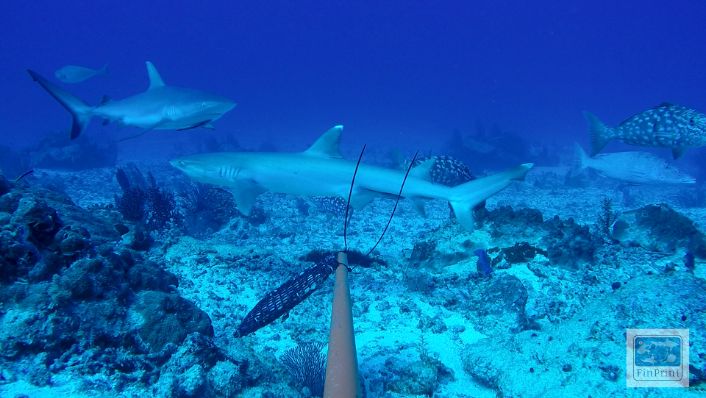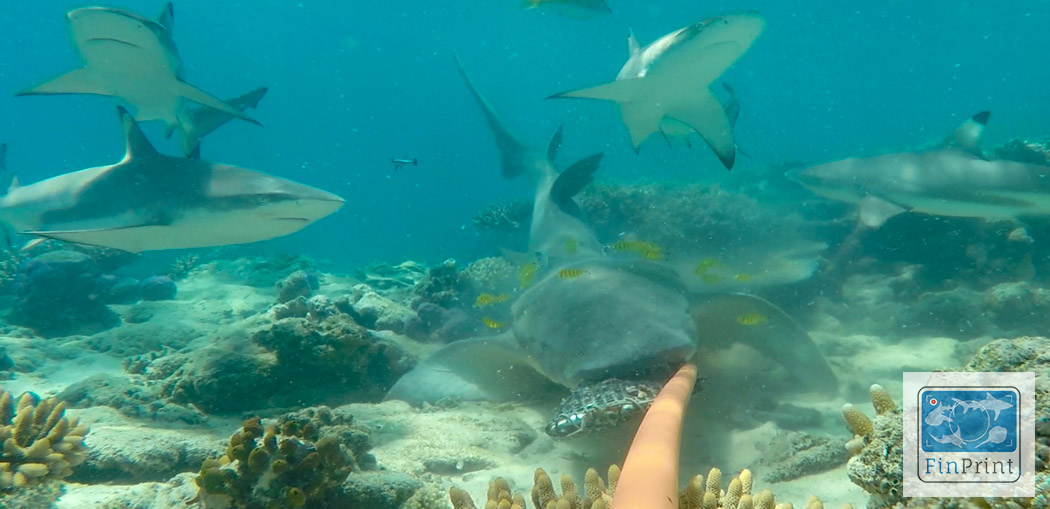Sharks and rays found on Australian coral reefs are faring better than the same species in other countries, but populations are still being depleted where there is less protection from fishing, according to a new study co-authored by Australian Institute of Marine Science (AIMS) researchers.
The results are part of Global FinPrint, a five-year international study published today in the journal Science, which has found that the five main shark species that live on coral reefs worldwide – grey reef, blacktip reef, whitetip reef, nurse and Caribbean reef sharks – have declined globally by an average of 63%.
The main driver of the population declines was found to be widespread overfishing.
In Western Australia, AIMS scientists found a ‘mixed bag’ of population results with some areas more depleted than others. Coral reefs with marine protected areas and fishing restrictions, a long way from human populations were found to have the healthiest shark and ray populations.

Dr Conrad Speed, a Perth-based marine ecologist at AIMS, was a key investigator for Global FinPrint on shark populations in the Indian Ocean.
“Compared to other regions around the world, the shark and ray populations in WA reefs are doing well,” he said.
“In the isolated reefs of the Rowley Shoals, located 270 miles off Broome and in part covered by a Marine Protected Area which has been preventing fishing of any kind for three decades, we saw good populations of the reef sharks and rays as well as the big, transient species like tiger sharks.
“However, the results were not as positive on Scott Reef – another isolated reef 200km north west of Broome. Here, the waters are open to fishing and accessible to fishers using traditional methods. We found fewer sharks here and have previously observed fewer large prey species. Other natural pressures that may impact reef shark communities include bleaching events and cyclones, although the extent of these combined pressures along with fishing is largely unknown. Fewer sharks on reefs may impact reef recovery times.”
Dr Speed said there is some evidence to suggest that sharks assist coral reef recovery by controlling numbers of carnivorous species like snapper that in turn prey on herbivore species like parrotfishes. These parrotfishes are important because they are known to eat turfing algae that may inhibit young corals from settling- these young corals are an essential start to coral reef recovery processes after an impact like a cyclone or coral bleaching event.
He added that sharks and rays have a number of other vital ecosystem roles in coral reefs. Scientists observed different species of both in abundance in healthy reefs.
But in some of the degraded reefs Dr Speed studied elsewhere in the Indian Ocean, he was only seeing rays.
“This is because there is limited fishing protection for a variety of social and economic reasons, meaning reef sharks have been overfished, resulting in only rays remaining. Some of these regions don’t have the resources to manage reefs and their shark populations effectively,” he said.

AIMS scientists also led surveys in the Western Pacific, including the Great Barrier Reef for the study, and the northern section was found to be one of the few locations with very high diversity (27 species) including both sharks and rays. Most of the Great Barrier Reef was found to have shark populations in a relatively intact state, with low levels of depletion of all main resident reef shark species.
The results of this research were collated from 22,000 hours of video footage from baited (underwater) cameras across 391 reefs in 67 nations and territories. The study was supported by the Paul G. Allen Family Foundation and led by Colin Simpfendorfer, Adjunct Professor of Marine and Aquaculture Science at James Cook University in Australia.
More than 150 researchers from more than 120 institutions across the world contributed to the research.








